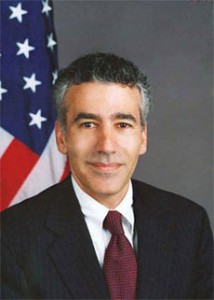Philippine News
US ambassador raises urgency in protecting oceans
MANILA — US Ambassador to the Philippines Philip Goldberg raised urgency for all sectors’ cooperation on protecting oceans, warning irresponsible human activities continue driving pollution, acidification and biodiversity loss which are all jeopardizing the marine environment and man’s future.
“Something needs to be done about the environmental degradation and pollution in waters,” he said Tuesday (June 17) during a seminar of the American embassy in Manila held in connection with the ‘Our Ocean’ conference the US Department of State spearheaded in Washington, DC this week.
The department noted the ocean “plays a vital role in the global economy by providing food and a source of income for millions of people” while regulating both climate and weather as well as serving as essential component for cycling water, carbon and nutrients.
Dumping garbage in water bodies and land must be addressed accordingly as “there’s a consequence to that kind of behavior,” noted Goldberg.
Experts cited pollution and loss of biodiversity as among adverse consequences arising from indiscriminate garbage-dumping.
The ‘Our Ocean’ briefer distributed during the seminar also noted about 80 percent of marine pollution originates on land.
Goldberg likewise cautioned against human activities that further increase carbon dioxide (CO2) emissions in the atmosphere.
“Carbon emissions are damaging the air and water,” he noted.
According to experts, CO2 mixes with ocean water so this water becomes acidic.
Studies also show the ocean already became about 30 percent more acidic since the Industrial Revolution’s start and this acidification is a trend that’s projected to continue, noted the ‘Our Ocean’ briefer.
“This rapid rate of CO2 uptake means the ocean’s chemistry is changing 10 times faster than at any other time in the past 50 million years,” the briefer also said.
At the seminar, USAID deputy chief for the Office of Environment, Energy and Climate Change Joseph Foltz echoed the need for action to save the world’s oceans.
He described ocean acidification as a threat to viability of the ocean system.
Goldberg added that action against unsustainable fishery practices like overfishing can help curb depletion of marine fishery species.
“Fishery stocks are declining,” he said.
Citing data Food and Agriculture Organization reported this year, ‘Our Ocean’ briefer said an estimated 29 percent of the world’s fish stocks are over-exploited.
Another 61 percent of global fish stocks can’t support expanded harvest so these require effective management and related measures to avoid decline.
“Unfortunately, existing mechanisms for international management of fisheries produced mixed results,” the briefer noted.
University of the Philippines-Visayas Prof. Nygiel Armada also cited the need to develop more effective fisheries management mechanisms so decline in fish stocks can be better addressed.
“Small-scale fishermen’s catch already declined by about half a ton per year,” he said at the seminar.
World Wide Fund for Nature-Philippines president and CEO Jose Maria Lorenzo Tan also highlighted need for wholistic management of fisheries.
“Fisheries must be managed through the ecosystem approach,” he said at the event.
Such approach covers integrated land, water and living resources management that equitably promotes conservation and sustainable resource use.
Goldberg is optimistic concerted effort of all sectors can still help address problems oceans are facing, however.
He cited the case of Boston’s Charles River which rehabilitation measures transformed from a polluted waterway to a recreational hub.
People can already swim in that river, he noted.
The embassy’s Environment, Science, Technology and Health Officer Heath Bailey highlighted need for all sectors to partner on protecting oceans.
“Government can’t do that alone,” he said during the seminar.
He noted the US government will continue prioritizing science and technology, as well as means of disseminating information on these, for its bid to protect the marine environment.
“We need scientists who also focus on outreach and education,” he continued.
During the seminar, the embassy played a video of the welcome remarks US Secretary of State John Kerry made earlier during the ‘Our Ocean’ conference.
“Stewardship of our oceans isn’t a one-person event – it’s a nation event, it’s a country event, it’s a universal requirement all across this planet,” he said.
Kerry hosted the conference to promote a healthier planet by creating a healthier ocean, the embassy said.
The conference focused on marine pollution, ocean acidification and sustainable fisheries to draw international attention to threats oceans worldwide face.
Discussions during the conference also covered measures all sectors can undertake to protect the marine environment and promote a sustainable future.
Philippine television personality Rovilson Fernandez shared, with the seminar’s participants, developments he witnessed during the conference.
He noted the conference’s delegates looked into ways to reduce use of plastics.
There were discussions also on a technology for catching target fish stocks only, he added.






















